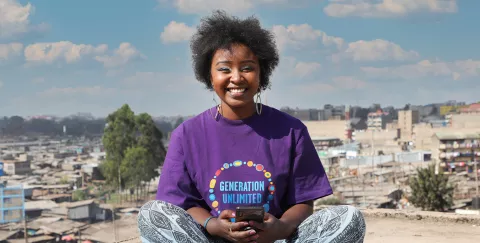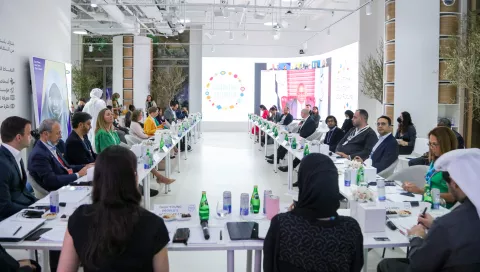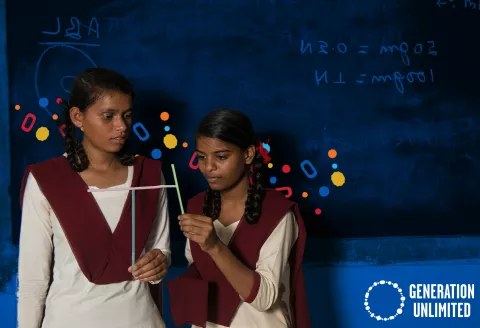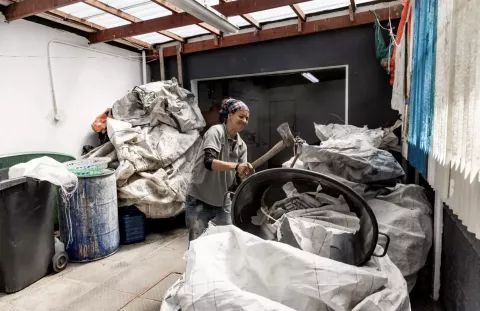GenU Global Board responds to COVID-19
The fourth meeting of the Generation Unlimited Global Board identified urgent solutions to address the needs of young people whose learning and employment opportunities are being impacted by COVID-19.
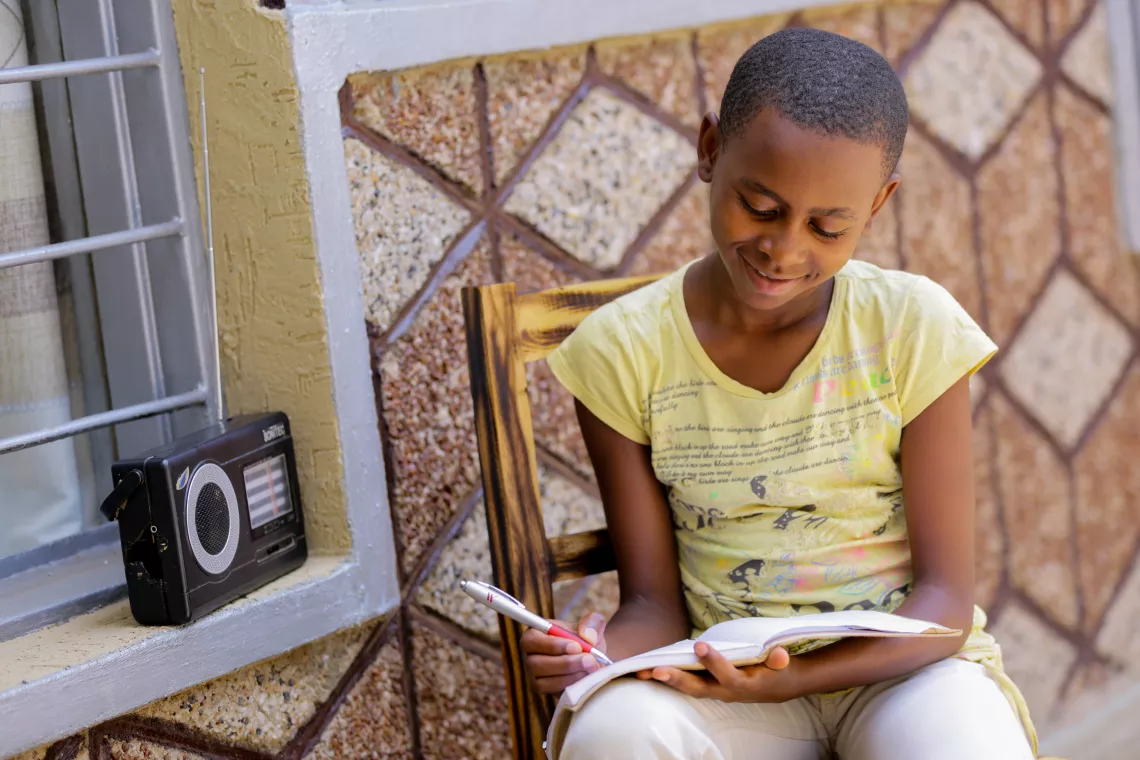
NEW YORK, United States, 27 April 2020 – The Generation Unlimited Global Board, comprising over 50 private, public and civil society leaders from across the globe – including 40 principals – convened virtually for its fourth meeting to urgently respond to the needs of young people whose learning and employment opportunities are being severely impacted due to the COVID-19 pandemic.
192 countries have so far implemented nationwide school closures, adversely impacting over 1.5 billion learners, and a global recession could lead to the loss of five to 195 million jobs, with grave consequences for young people.
“I must say that I am stunned by what is happening in our education system – the global pandemic is creating an exacerbated learning crisis,” said UNICEF Executive Director Henrietta Fore. “Generation Unlimited’s work is now being looked at in the light of COVID-19 and it is now more important than ever. We have much impressive progress, but we really need to do much more and we need to do it much faster.”
GenU’s four priority areas
Board members were asked to focus their efforts as part of Generation Unlimited (GenU) to four key areas, including connecting all schools and young people to the internet, scaling up remote online learning and skilling platforms, boosting entrepreneurial skills and opportunities, and empowering youth as changemakers during the current crisis and beyond.
“We need to ensure that the COVID-19 response is helpful and relevant for young people,” said Annette Dixon, Vice President for Human Development at the World Bank, co-hosting the meeting. “Let’s work together to provide them the tools needed to complete their education without interruption, and quickly recover from this crisis.”
Through its global network of partners working to create opportunities for young people’s education, employment and entrepreneurship, GenU can play a central role in addressing both the pandemic’s short- and long-term impacts on youth.
“I have seen firsthand how the lack of access to quality education, job opportunities and labour market skills can leave young people on the margins of society, and this risk is even more real during this pandemic,” commented Lisa Njenga, Generation Unlimited Youth Engagement Officer and another co-host of the meeting. “Generation Unlimited partners now have an even greater collective responsibility to take drastic action and leave no one behind.”
Frontrunner Countries quickly adapting plans to COVID-19
A few Generation Unlimited Frontrunner Countries shared examples of country-level adaptation to the new situation. Mr. Joseph Mucheru, Cabinet Secretary of the Ministry of ICT, Innovation and Youth Affairs of the Republic of Kenya, spoke about the country’s work to scale up the previously established “Ajira Digital Program” introducing young people to digital and digitally enabled work. The government is also providing financial to support artists, actors and musicians – sectors popular among young people.
In Bangladesh, the government in collaboration with GenU has agreed on a target of creating more than 17 million new opportunities for youth skills, entrepreneurship and employment by 2024. In light of emerging needs related to COVID-19, plans are underway to adapt existing programmes, such as the National Skills Portal – which connects skills providers, industries, youth and government – to better respond to the changing situation. Senior Policy Advisor Anir Chowdhury noted that the country is also ramping up the development of a National Adaptive Framework for Future of Work as well as a Collective Intelligence Platform to support the framework, reflecting on the options and opportunities disrupted or availed by COVID-19. Opportunities for girls and women in vocational training and employment are also being scaled up to safeguard the groups most vulnerable to the pandemic’s long-term impacts, and by 2021 the government will embed vocational skills within the national secondary education curriculum to respond to anticipated socioeconomic changes.
YuWaah! – or Generation Unlimited in India – together with partners is focusing on the short- and long-term needs of young people, particularly through a range of technological solutions for young people’s skills development, employment and engagement. This includes 21st-century skills training that utilizes technology, playbooks on starting small businesses in cities, and the scale-up of career guidance through digital platforms, such as iDreamCareers. Through the online education platform UNiLearn, YuWaah! and partners are also facilitating young people’s access to flexible home-based learning via radio, television, Facebook and WhatsApp. The aim is for the platform to reach at least 50 per cent of the nearly 255 million elementary and secondary school students and adolescents who are currently out of classrooms in the country.
In Rwanda, young people have been playing a critical role in the response to COVID-19 through volunteering to distribute food to vulnerable people, raising awareness about the pandemic and related health measures through social media, and developing ways to produce hand sanitizers, medical masks and online services to distribute essential goods. Minister of Youth Rosemary Mbabazi shared that the country is starting a “stay@home” challenge to engage young innovators to share ideas for remaining productive during the lockdown. The Government has also partnered with the private sector to provide free e-learning platforms for students to continue their studies as well as delivered educational programmes via radio and TV to reach rural communities. The development of the GenU country investment agenda in Rwanda will take into account the response to COVID-19 and identify effective interventions that can be scaled to mitigate the impact of the crisis – and future crises – on young people.
Sobel Aziz Ngom, Founder and Executive Director of Social Change Factory – and the initiator of Generation Unlimited in Senegal – shared that GenU Senegal will be accelerating the creation of a national one-stop-shop platform of learning, work and volunteering opportunities with sponsorship secured for a free internet connection for one million people for the first year.
Private and civil society partners announce commitments
During the meeting, multiple partners from the private sector, international financial institutions and civil society made concrete commitments to GenU to address young people’s needs during COVID-19.
The International Labour Organization (ILO) and GenU announced a groundbreaking partnership: the Global Initiative for Decent Jobs for Youth and GenU will be co-branded, promoting both immediate and long-term solutions to use technology to enhance young people’s skills development, decent work, and engagement, including through a joint Knowledge Facility providing curated tools and resources for policymakers and practitioners. ILO also committed to taking on a leading role with UNICEF in selected countries – with Bangladesh, Nigeria and Sri Lanka in the first wave – to convene partners and stakeholders to operationalize and advance country-level work and identify areas of investment and action.
Microsoft Corp. announced that – as part of GenU and in collaboration with UNICEF – it will expand the Learning Passport to help children and youth affected by COVID-19 to continue their education at home. PwC has made a multimillion-dollar contribution to GenU and is leading on a thought leadership piece to upskill teachers globally as well as upskilling youth in India and South Africa in response to COVID-19 and beyond. The Department for International Development of the United Kingdom, SAP and SOS Children’s Villages International are focusing on the facilitation of digital learning offerings and remote learning platforms, and Dubai Cares is reviewing a $2.5-million request for the rollout of digital connectivity. The Children's Investment Fund Foundation is scoping a multi-million dollar investment to start, support and accelerate digital learning for primary, secondary and tertiary education in India, with a goal of delivering digital learning opportunities to one million children in the Rajasthan state hit early and hard by COVID-19. In Malaysia, Telenor’s business unit DiGi together with UNICEF and the Government has launched the Future Skills for All programme, which aims to make digital skills learning easier and accessible for schoolchildren, particularly in underserved areas of the Sabah province.
“The pandemic facing our world today is impacting the world’s economy, job security, opportunity and prospects along with what the workforce of the future looks like, and resulting from all of that, our educational systems,” said Robert E. Moritz, Chairman of the PwC International Network. “In this challenging environment, it is all the more important we keep a focus on upskilling society, particularly the youth – our next generation of leaders. They represent the hope for a better tomorrow.”
Partners such as the International Youth Foundation, the Organisation for Economic Co-operation and Development (OECD), the United Nations Department of Economic and Social Affairs (UN DESA) and the World Organization of the Scout Movement are looking to share content and offer their expertise in dealing with policy issues and ensuring inclusivity and equity through digital connectivity as well as online learning and skilling opportunities. The New York Academy of Sciences has developed upskilling solutions that could be used for the training of teachers on remote learning.
ING reiterated its ongoing support to GenU through the Power for Youth programme, UPSHIFT and fintech startups, while DSM made a call to action to support young African smallholder farmers through modernized agricultural skills, digital solutions for a sustainable food value chain, and access to microloans and insurance.
The African Union Commission will be implementing a communications campaign to raise awareness of COVID-19, targeting the most vulnerable young people, and the Tony Elumelu Foundation – a key partner of GenU in Africa – is empowering tens of thousands of young entrepreneurs to tackle the pandemic and other challenges in the region. The African Development Bank announced the launch of the three-billion-dollar “Fight COVID-19 Social Impact Bond” and a $10-billion COVID response fund to directly address the crisis.
“Engaging youth is key to ensuring Africa emerges from the coronavirus crisis stronger than before. The Bank’s Jobs for Youth initiative aims to prepare 50 million young people with skills for the future workforce,” said Jennifer Blanke, the African Development Bank’s Vice President of Agriculture, Human and Social Development. “Teaming up with the Generation Unlimited ecosystem can help us reach this goal.”
The fourth Board meeting showed growing momentum among partners with increasing commitments for young people amidst the global pandemic. GenU will now be even more strongly positioned to serve as a leading global platform helping secure an opportunity for every young person to reach their full potential through education, employment and entrepreneurship.
Further information on Generation Unlimited partners’ contributions to the COVID-19 response is available and will continue to be updated here. To learn more about the Generation Unlimited Global Board, visit here.

